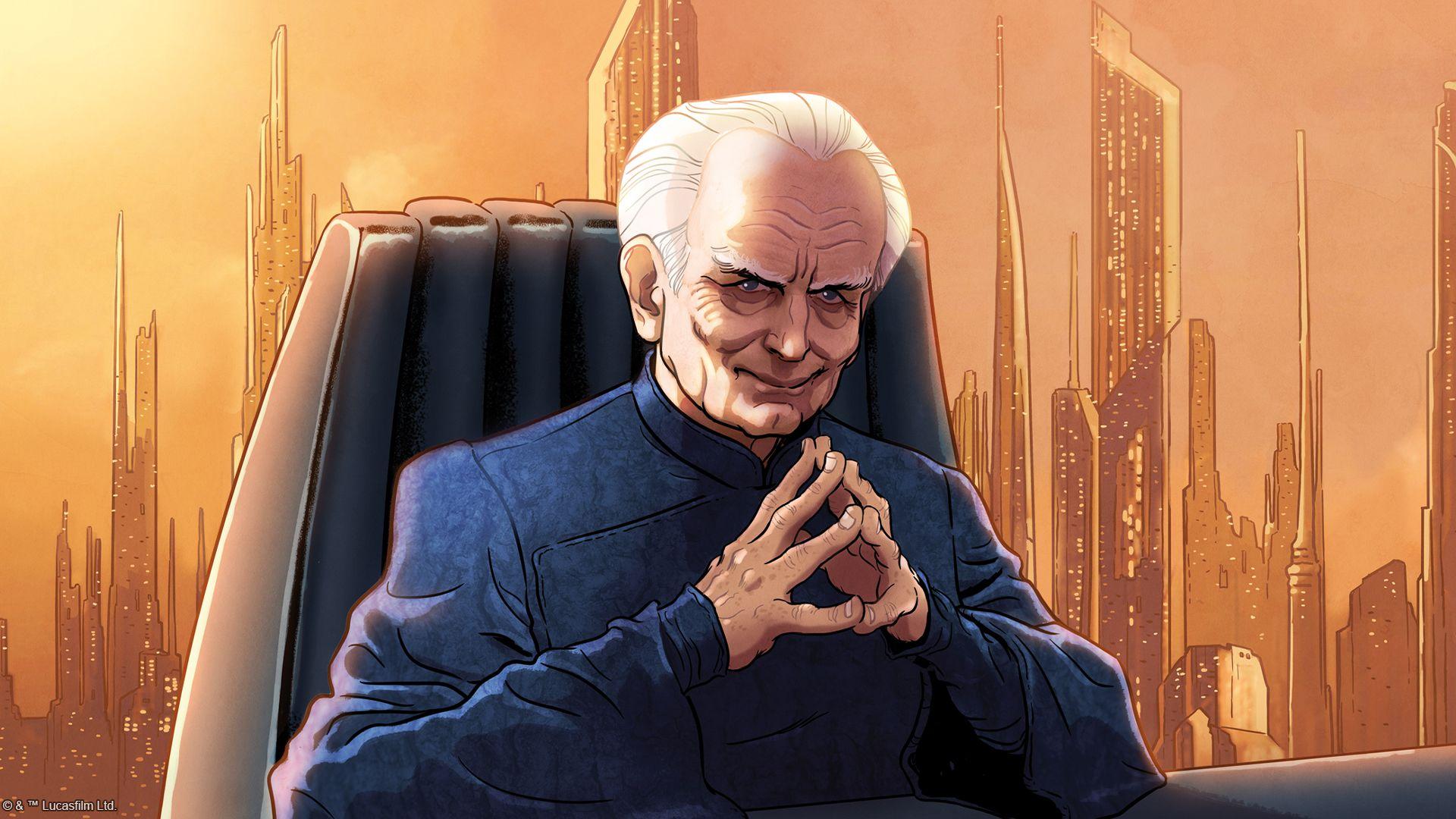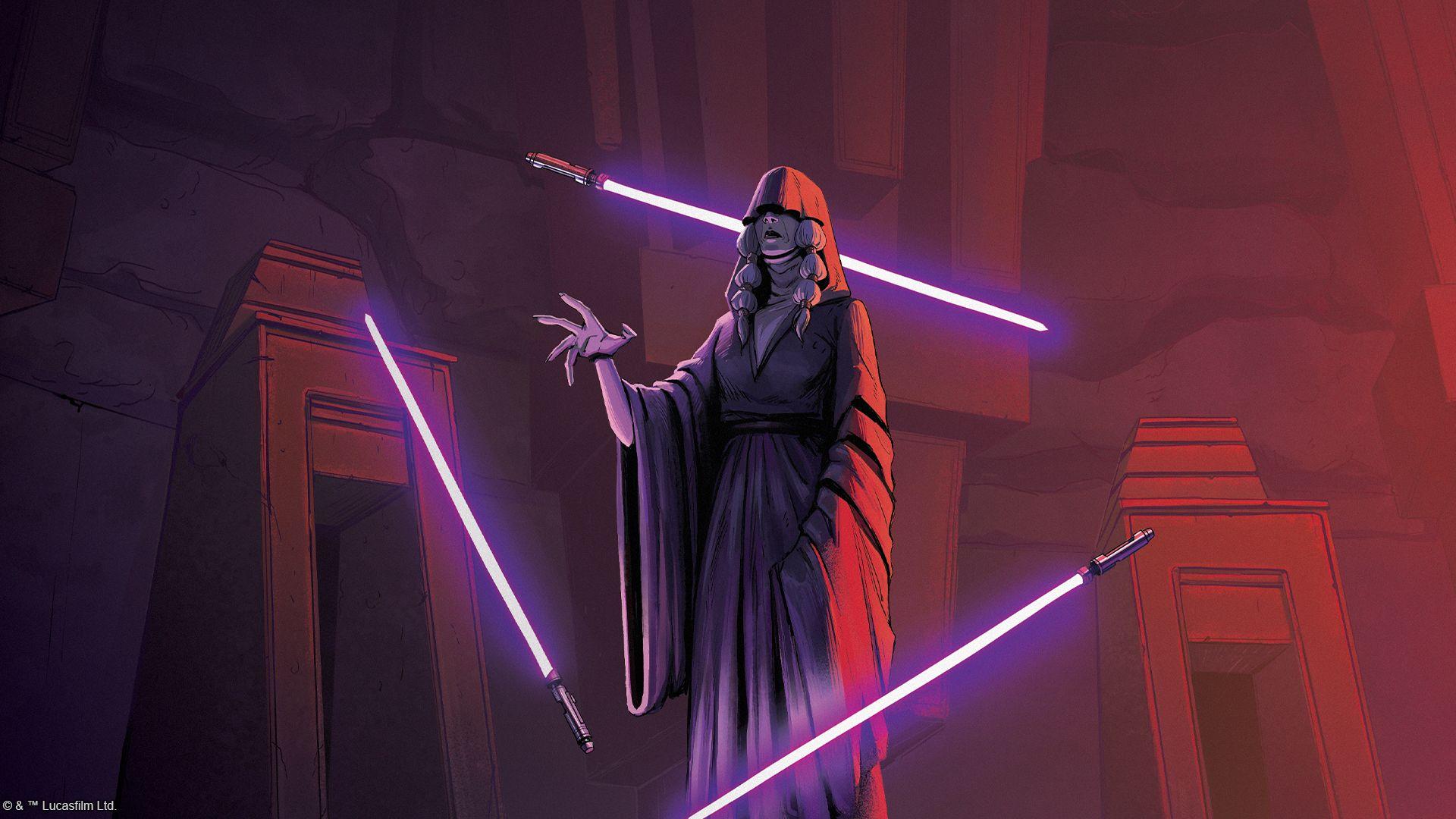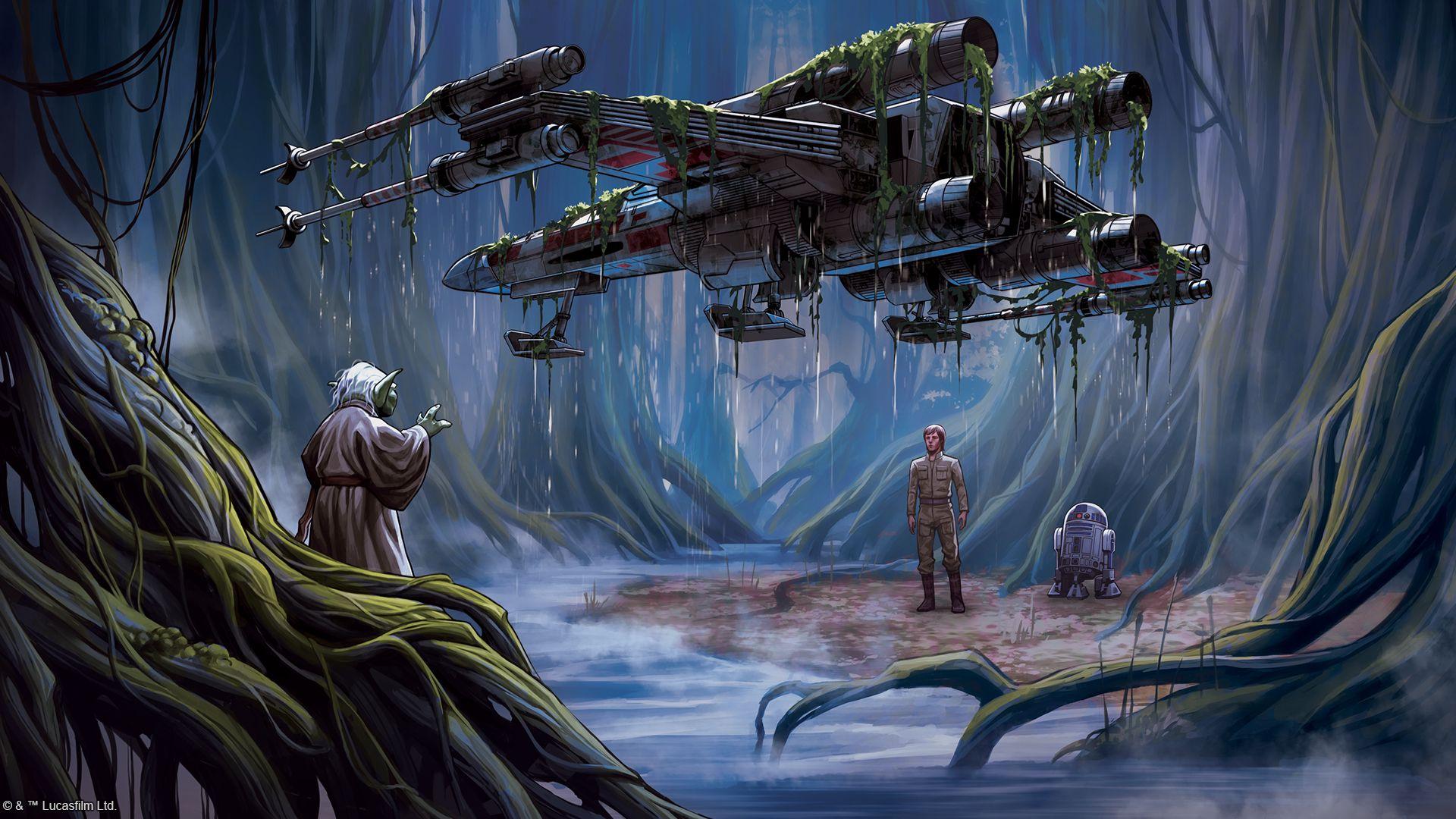Drafting for Competitive
October 22, 2025 | Written by Tyler Parrott, Michael Dunsmore, and Ryan Miles
Back in July, during the Galactic Report on the final day of the Galactic Championship, we revealed that limited formats would be coming to Competitive-tier events for the Star Wars™: Unlimited trading card game. Since draft and sealed were baked into this game's DNA from the very beginning, it only makes sense that players should be able to test their skills in these limited formats at the tournament scene.
Today, we asked Tyler Parrot, Michael Dunsmore, and Ryan Miles of the Star Wars: Unlimited design team to provide some insights, tips, and tricks on just one of these limited formats: draft play. Read on for their thoughts on how things differ when you approach the format in a Competitive light!
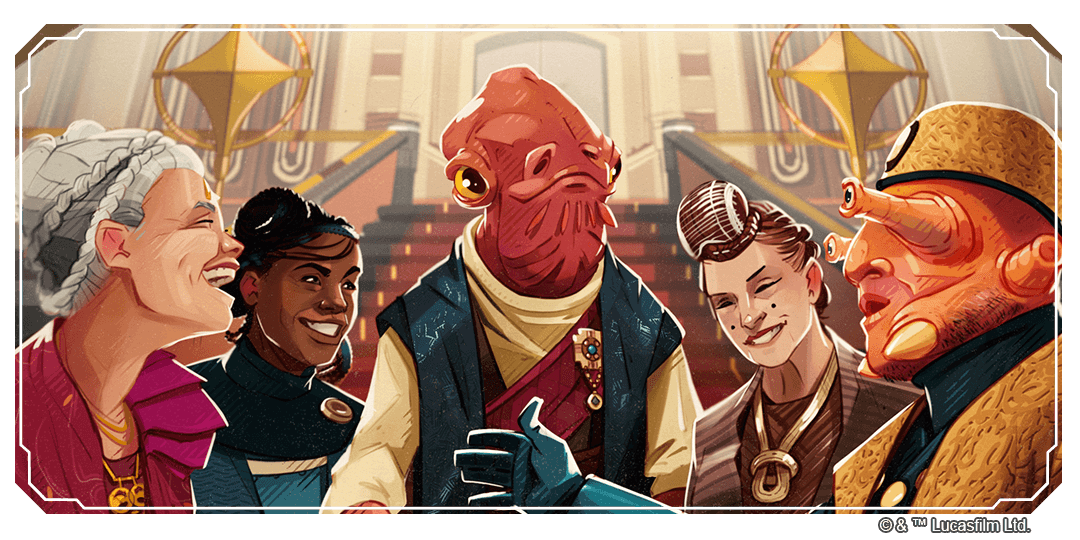
Large-scale Competitive tournaments have a very different “vibe” compared to store-level Casual events. How would you approach draft play differently at a Competitive event than you would at a Casual one?
Tyler: At a Competitive-tier event, players are uniquely motivated to win, so you may find the drafting experience more intense than when drafting with your friends at your local game store. Don't be intimidated! Since draft is a format that requires in-the-moment decision making, there are lots of opportunities to outmaneuver the competition as long as you stay focused. If you prepare ahead of time, going into the draft with a clear strategy is going to make the experience way smoother while also setting you up for success. And whether you do that or not, you'll want to prioritize cards exclusively for their power or synergy rather than how much you may enjoy playing them. Keep your eyes on the prize!
Michael: With any Competitive event you always want to be prepared. That means, if you want to do your best, it shouldn't be the first time you are drafting for that set. Having some experience with the cards and the format will help keep your nerves in check when bigger prizes and more bragging rights are on the line.
On a more practical note, if your goal is to do your best in the event, stay focused on the cards you are drafting and prioritize picking cards that support the strategy of the deck you are building. Try not to get distracted by picking the Hyperspace foil card that will look great in your binder. Save those picks for when you are playing more casually.
Ryan: In a Competitive event, one of the most important things is to keep your options open, and try to read signals from the rest of the table. You have to think about not just what cards you are receiving, but also what you are passing to the next player. What aspects are showing up less often in the packs you are receiving? What aspects are the best cards that you are passing? Finding an open lane and being the only person looking for a particular aspect combination can be just as impactful to building a strong deck as opening a powerful Legendary card.
What are some unique features of draft play (compared to Premier) that players should keep in mind while playing in a draft tournament?
Tyler: Unlike Premier, draft is a format that rewards knowledge of the whole set and the ability to play every kind of deck a little bit. So rather than trying to do something really specific and focused, your best path to success is often to play efficient, straightforward cards at every point in the cost curve and continually apply pressure to your opponent. There definitely still are a variety of decks that exist in a draft metagame, but since every deck is a variety of “midrange,” you're going to have the most success if you keep your strategy flexible and adaptable based on what you draw and what your opponent plays.
Michael: You need to pay attention to the Common and Uncommon cards. Unlike in a constructed deck, where a large percentage of your deck can be filled out with Rare and Legendary cards, in draft, the majority if your deck will be Commons and Uncommons. That means a simple 2-cost unit like Secretive Sage (Legends of the Force, 61) will play an important role in your deck.
Another great tool when drafting Star Wars: Unlimited is that the drafted leader cards stay public information. Be sure to look around the table at what leader cards each player has available. That can give you some information about what cards or aspects your opponents could be looking to draft.
Ryan: Draft is the ultimate test of card evaluation and deckbuilding. There's no metagame to try and figure out, no matchups to study, no lines of play to memorize, no deck lists to pull from the internet; you have to make choices on the fly and build the best deck you can with minimal options. It's also a format that rewards incremental advantages; Commons and Uncommons tend to not be very good comeback tools, so every decision tends to matter a little bit more throughout the whole game.
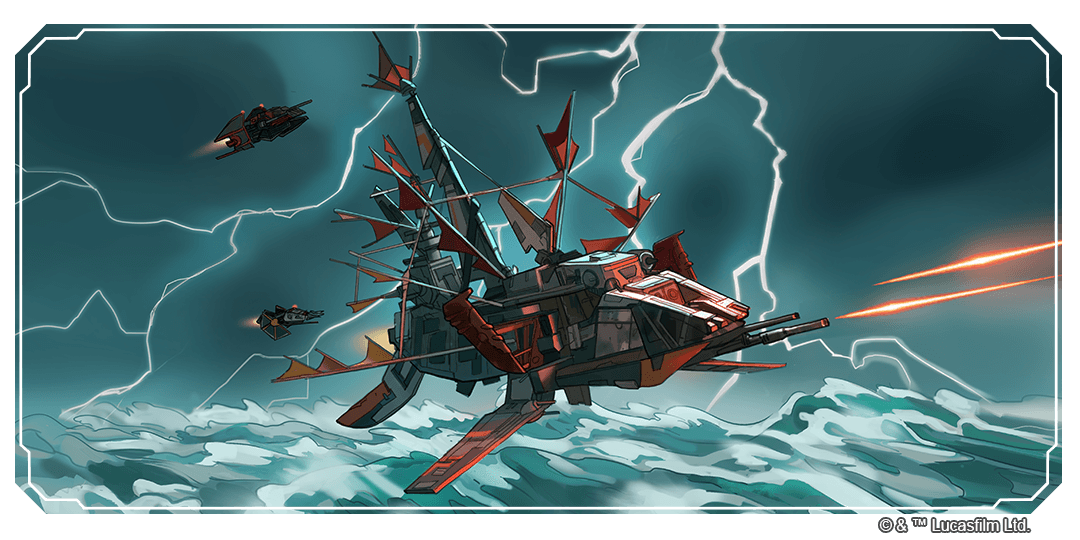
Since draft play doesn't involve any deckbuilding beforehand, do you have any recommendations on how players can prepare for a Competitive draft tournament?
Tyler: The best way to prepare for a Competitive draft event is to draft a lot. Nothing can replace experimentation and practice, because there's no faster way to see what games look like—and what cards are strong—than by playing with them. But just playing games also isn't enough; you'll also find your greatest success by discussing your decisions (especially in the draft portion) with friends and teammates. I've gotten so much better at draft by deliberating with someone about my draft picks after the draft. It forces me to justify my decisions and see what I had overlooked or forgotten so I do better next time. You won't have someone to deliberate with during the event, so the more you can learn beforehand, the better.
Michael: Like Tyler said, there is no substitute for practice. The best thing you can do to prepare is to play Casual draft tournaments with the set you will be drafting in Competitive events. Failing that, learning the cards will help you out a lot, especially knowing what Common rarity leaders are in the set, which can help you know what to strategies you are likely to see.
Ryan: Echoing the words of the other two, if possible, the best way to prepare for Competitive draft is to practice drafting at your local game store! Aside from that, a very important skill to build is card evaluation; on the Star Wars: Unlimited card database, look up the set you are intending to draft, and try to build a few 30-card decks only out of Common and Uncommon cards and leaders. Grab a friend and play these decks against each other. What cards stood out as strong? What cards did you find yourself resourcing often? What cards didn't get included in your decks? Simulating the lower-power environment of the format, even while using constructed decks, can be a big help to understand what's strong in draft play.
What are some tips and tricks you can provide for drafting a deck at a tournament? What are some common pitfalls that players should try to avoid?
Tyler: The thing about drafting, whether in a Competitive environment or a more Casual one, is that you need to prioritize fundamentals. No matter how cool or exciting your cards are, if you don't have a reliable curve of units—with about seven 2-cost units for the first turn, a handful of expensive units that can win the game quickly, and at least six space units—then you're going to have a tough time keeping up with someone who plays a unit at each point in the cost curve and attacks your base. For the upcoming Secrets of Power draft format, you'll also want to pay attention to the aspects of the cards you're drafting, to ensure you have the correct concentration of aspect icons to maximize your ability to use your disclose abilities at any given time.
Michael: This is often-heard advice for drafting, but that is because it is true: try to stay open to what deck you are drafting during the first pack. You will end up with a better deck if there is less competition for the aspects you are choosing. What that means is if you are planning to play a specific leader you drafted but you notice that cards that match their aspects are getting chosen out of the packs quickly, look and see if you could play one of your other leaders that has aspects that are more available.
Ryan: You don't get any bonus points for drafting 42 cards in your aspects! Your deck only has to be 30 cards, which gives you 12 cards of wiggle room. Some of these will be the last few cards of a pack that trickle around to you, but utilizing every card is important. That could mean taking generically powerful cards early on, even if they don't share aspects, or it could mean taking high value off-aspect cards to deny other players, especially when that pack's options for your aspects aren't very impressive. A common mistake is taking a mediocre in-aspect card in a late pack, that you know won't make your final 30, when you could instead take something more powerful and make a future opponent's deck less scary.
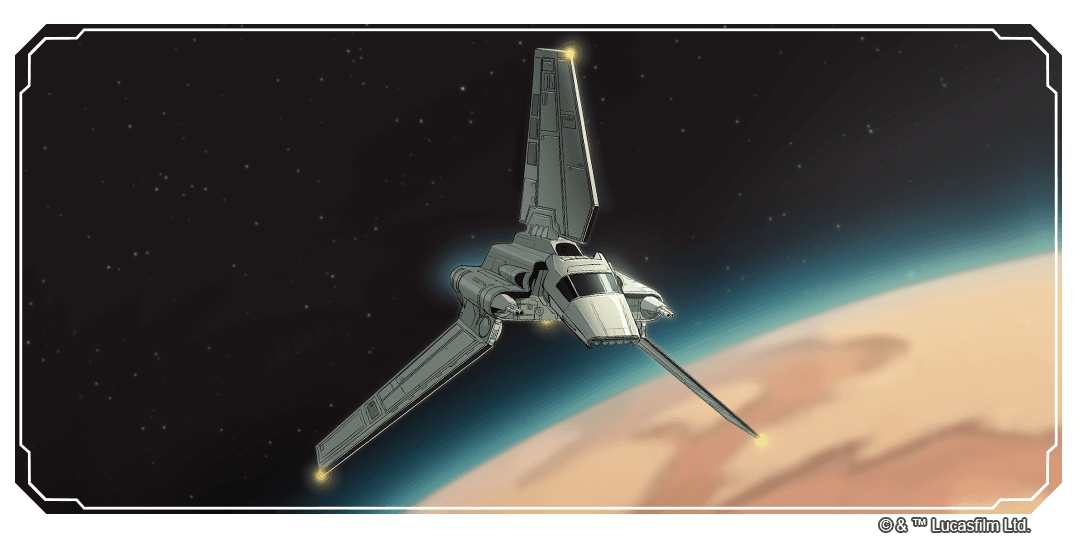
As we approach the release of Secrets of Power, what cards from the new set should players be on the lookout for in Competitive draft events?
Tyler: Because this format is slightly slower in the early game, making sure you have finishers is really important. Cantwell Arrestor Cruiser (Secrets of Power, 37) and Renowned Dignitaries (Secrets of Power, 102) can be really effective in that role as cards that both win the game quickly and stabilize you if you're behind on the board, but there are also cards like The Galleon (Secrets of Power, 141) and Hunter (Secrets of Power, 208), which will make it very difficult for your opponent to stabilize against you. Plot cards are less strong in draft than they are in Premier, so they don't need to be high priorities unless they're particularly strong, like Jar Jar Binks (Secrets of Power, 111) or Lurking Snub Fighter (Secrets of Power, 189). Aggressive Official decks certainly can exist, in which case you're going to want to go wide in Command/Villainy with cards like ISB Shuttle (Secrets of Power, 83) and Corporate Warmongering (Secrets of Power, 91), or to load up on multiple copies of High Command Councilor (Secrets of Power, 249) in Heroism, which are typically bad on their own but can be effective when you have lots of them.
Michael: I like to look for Common rarity cards that give me value in more than one way. Nimble Prowess (Secrets of Power, 69) is a great example; as an upgrade, it increases the stats of your attached unit and also helps you control your opponent's threats. As Tyler mentioned, the ISB Shuttle (Secrets of Power, 83) is another great Common as it makes a unit for you in both arenas; it is literally two cards in one. The last Common card I am going to call out is Duchess's Investigators (Secrets of Power, 223), which is a solid mid-game unit that also gives you the advantage of making your opponent discard a card.
Are there any other insights regarding Competitive draft play that you would like to share?
Tyler: Resourcing decisions in the Secrets of Power draft format are especially important because of disclose. One of the skills that I expect to separate the good players from the great ones is the ability to know when a card is important for disclosing, when it's important to play, and when it needs to be a resource. When you're playing Secrets of Power draft, you should always be asking yourself what your long-term goals are, and drafting or playing your deck towards executing that goal!
Michael: Drafting in Star Wars: Unlimited is incredibly fun! It is a great way to remove the roadblocks related to collecting cards, and it also lets you flex your deck building skills on a level playing field.
Condividi Post

